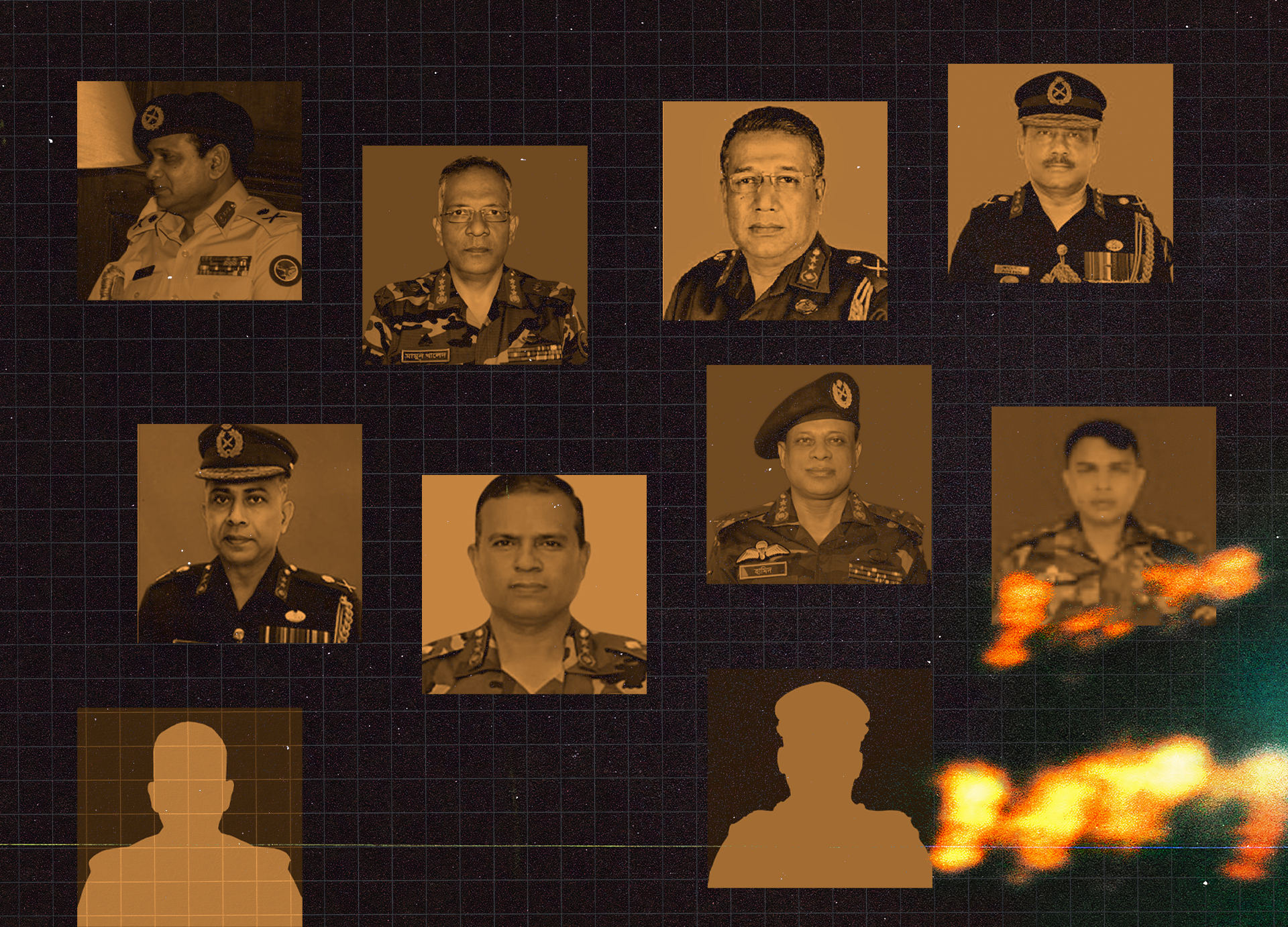10 Bangladesh army officers “fled abroad despite warrants and travel bans”
Despite cancelled passports, travel bans and arrest warrants, at least 10 Bangladesh army officers accused of having participated in the state terror practice of enforced disappearance, have fled the country, according to an inquiry official

“Ever since my father disappeared, whenever I see that black uniform, I think of them as black-clothed hyenas. They are monsters in the guise of men. When my brother sees RAB, he gets scared,” recalls Anisha Islam Insa, whose father, Ismail Hossain Baten, a businessman and BNP leader, was abducted by Rapid Action Battalion (RAB) operatives from Dhaka’s Mirpur on June 19th 2019.
During former Prime Minister Sheikh Hasina’s near-16-year uninterrupted rule, Bangladesh grappled with the crime of enforced disappearance – a state-sanctioned practice carried out by law enforcement and intelligence agencies, often targeting individuals with opposition ties.
Following the collapse of her government on August 5th last year, the newly-installed interim administration set up a commission of inquiry to investigate the cases. The special prosecutor at the International Crimes Tribunal (ICT) began preparing charges, too.
In the months that followed, the government revoked the passports of 42 law enforcement officers for their alleged roles in enforced disappearances and extrajudicial killings. The Ministry of Home Affairs imposed travel bans on 11 officers from the Directorate General of Forces Intelligence (DGFI), 15 from RAB, six from the Counter Terrorism and Transnational Crime unit (CTTC) and Detective Branch (DB) of the police, and 10 from the army. In January, the ICT issued arrest warrants against several of these officials.
Despite these measures, the Commission of Inquiry on Enforced Disappearances soon discovered a major setback: a number of the accused had managed to flee the country.
“We have a lot of evidence [of such cases],” says Nur Khan Liton, human rights advocate and a member of the commission.
The Commission stated that at least 10 suspects, ranging from warrant officers to top generals, had absconded.
These security force officers are Lieutenant General Molla Fazle Akbar, Major General Sheikh Mamun Khaled, Lieutenant General Md. Akbar Hossain, Major General Md. Saiful Abedin, Major General Md. Saiful Alam, Major General Ahmed Tabrez Shams Chowdhury, Major General Hamidul Haque, Colonel Mahadi Hasan, Warrant Officer Md. Ziaur Rahman and Warrant Officer Imrul Kayes.
The first seven of them served as the DGFI chief between 2009 and 2024 – a period coinciding with Hasina’s tenure.
How these individuals managed to escape, despite court orders and travel restrictions, remains a mystery.
“We have a huge land border with India. It is possible to make a crossing there. Then we have also learned about crossing immigration at the airport with the internet turned off,” Khan says. “We have informed the Chief Adviser about this. We also had these questions for the Army Chief.”
Khan noted that poor enforcement of official directives enabled the accused to slip away. “If the government or various forces had been vigilant in this regard, it would have been possible to prevent [these escapes]. We are certain that they were in the country when the travel ban was imposed.”
Netra News earlier reported on how a former president’s exit through the Dhaka airport was facilitated by the country’s military-run spy agencies.
Khan stated that the Commission has contacted the Army Chief, General Waker-uz-Zaman, about the whereabouts of the 10 former officers, but received no substantial response.
Fading hope
Insa’s family initially felt hopeful when the Commission was formed. That optimism is now fading.
“If they submit their report within 3 months, we might know what happened to my father. But the person we have a complaint against still roams free. And we spend day after day, night after night without sleep,” she says.
“Even after the fall of Hasina, I don’t know what happened to my father.”
Her mother, Nasrin Akter Srithi, also questioned the government’s resolve. “I don't think we ever laugh. My son has become severely traumatised,” she says, as the family awaits justice and an emotional closure.
Legal experts warn that the failure to prosecute those responsible will set bad precedents.
“If justice is not ensured, in future, others can feel emboldened to participate in these crimes,” argues Supreme Court lawyer Manzoor Al Matin. “Additionally, the respect and credibility of various forces, including the army, depend on whether sufficient steps are taken.”
Khan echoed the concern: “It is very important that there is a visible trial so that such criminals or people in these professions feel that they cannot get away with committing such crimes.”
Al Matin added, “The Commission and the government must first and foremost clearly state who they asked for information, when they asked for it, and what the forces said in response.”
“And the forces also have a responsibility to give these answers and take all kinds of steps to find these people. No force or government can avoid this responsibility.”
Netra News contacted the Inter-Services Public Relations (ISPR) for comment but received no response. At a press briefing held at Dhaka Cantonment on July 3rd, Colonel Md. Shafiqul Islam of the Military Operations Directorate pledged that legal action would be taken against army personnel involved in enforced disappearances.●
(Editor’s note: In the sixth paragraph, we have corrected that Nur Khan Liton was a human rights advocate, not a lawyer, and a member of the commission, not its head.)